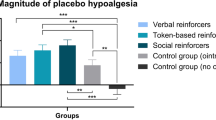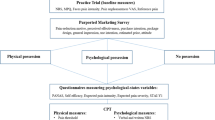Abstract
The discovery of an endogenous opioid-mediated analgesic system1,2 has led to the search for its physiological roles and how it might be activated in natural conditions. Environmental and surgical stress and certain forms of transcutaneous electrical stimulation or acupuncture appear to activate this system3–5. Several studies also suggest that this opioid system mediates placebo analgesia. Placebo reduces post-surgical pain in comparison with no treatment6, and this analgesia is apparently reversed by the opioid antagonist, naloxone6–8. However, these studies did not indicate whether naloxone and placebo exert their effects by common or by separate mechanisms. By administering hidden infusions of naloxone (in subjects unaware that the medication was being given) separate from the administration of a placebo, we were able to assess the effects of these two treatments independently. We report here evidence that placebo analgesia can occur after blockade of opioid mechanisms by naloxone and that naloxone can produce hyperalgesia independent of the placebo effect. The combined action of these effects is sufficient to explain the reversal of placebo analgesia by naloxone.
This is a preview of subscription content, access via your institution
Access options
Subscribe to this journal
Receive 51 print issues and online access
$199.00 per year
only $3.90 per issue
Buy this article
- Purchase on Springer Link
- Instant access to full article PDF
Prices may be subject to local taxes which are calculated during checkout
Similar content being viewed by others
References
Snyder, S. H. & Childers, S. R. A. Rev. Neurosci. 2, 35–64 (1979).
Yaksh, T. L. & Rudy, T. A. Pain 4, 299–359 (1978).
Watkins, L. R. & Mayer, D. J. Science 216, 1185–1192 (1982).
Cohen, M. et al. Lancet 1, 213–214 (1981).
Mayer, D. J., Price, D. D. & Rafii, A. Brain Res. 121, 368–372 (1977).
Gracely, R. H. et al. Soc. Neurosci. Abstr. 5, 609 (1979).
Levine, J. D., Gordon, N. C. & Fields, H. L. Lancet ii, 654–657 (1978).
Levine, J. D., Gordon, N. C., Jones, R. T. & Fields, H. L. Nature 272, 826–827 (1978).
Melzack, R. Pain 1, 277–299 (1975).
Barber, J. & Mayer, D. Pain 4, 41–48 (1977).
Goldstein, A. & Hilgard, E. R. Proc. natn. Acad. Sci. U.S.A. 72, 2041–2043 (1975).
Chapman, C. R., Colpitts, Y. M., Benedetti, C., Kitaeff, R. & Gehrig, J. D. Pain 9, 183–197 (1980).
Abram, S. E., Reynolds, A. C. & Cusick, J. F. Anesth. Analg. 60, 81–84 (1981).
Lewis, J. W., Cannon, J. T. & Liebeskind, J. C. Science 208, 623–625 (1980).
Grevert, P. & Goldstein, A. Science 199, 1093–1095 (1978).
Dingledine, R., Iversen, L. L. & Breuker, E. Eur. J. Pharmac. 47, 19–27 (1978).
Author information
Authors and Affiliations
Rights and permissions
About this article
Cite this article
Gracely, R., Dubner, R., Wolskee, P. et al. Placebo and naloxone can alter post-surgical pain by separate mechanisms. Nature 306, 264–265 (1983). https://doi.org/10.1038/306264a0
Received:
Accepted:
Issue Date:
DOI: https://doi.org/10.1038/306264a0
This article is cited by
-
Words and Drugs: Same Mechanisms of Action?
Journal of Contemporary Psychotherapy (2016)
-
Molecular mechanisms of placebo responses in humans
Molecular Psychiatry (2015)
-
Opposing neural effects of naltrexone on food reward and aversion: implications for the treatment of obesity
Psychopharmacology (2014)
-
Specifying the non-specific factors underlying opioid analgesia: expectancy, attention, and affect
Psychopharmacology (2014)
Comments
By submitting a comment you agree to abide by our Terms and Community Guidelines. If you find something abusive or that does not comply with our terms or guidelines please flag it as inappropriate.



